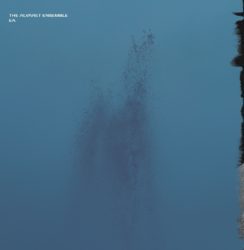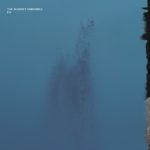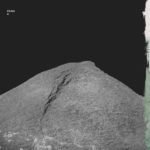THE ALVARET ENSEMBLE – EA 
The map of Eilean Records was completed at the end of 2019 with its 100th release (or ‘map point’), but that does not mean the label curator Mathias van Eeclo is resting now. He immediately cleaned up (the beautiful Eilean website seems gone) and without a single pause started a new project: laaps records.
A new project, also destined to release 100 titles (‘bridges’) with a strong concept:
Each of the albums will have a “sound imprint connected to each of the four seasons”, and has to start at the end of the previous one (hence ‘bridges’).
Let that concept sink in for a moment. A ‘linked’ series like this is a completist’s dream (or nightmare): miss one and the chain is broken… Better start saving now!
Proud openers of the brand-new Laaps series is The Alvaret Ensemble, the improvisational collective, in this case featuring Greg Haines (piano), Jan Kleefstra (poems, spoken word), Romke Kleefstra (guitar, bass, effects), Sytze Pruiksma (percussion) and invited guests Olga Wojciechowska (violin) and Joana Guerra (cello).
The original sessions for this album were recorded in a church in Leeuwarden at night. The music is played without scores or discussion, resulting in many hours of music from which this set was selected.
It is a set more introspective than on their previous (two) albums The Alvaret Ensemble and Skeylja. The musical palette is enriched by the prominent presence of the violin and cello (and church organ), while all of the musicians play their part in a restrained, almost modest way – as if they only want to accentuate the dreamlike and monotonously voice of Jan Kleefstra softly declaring his poetry, casting a spell even if you cannot understand a word of his Frysian language.
Music “perfect for winter, when color has been leeched from the landscape and all has been laid bare.”
FEAN – II
Crossing the first ‘bridge’ to the next Laaps release is not a very big step: the second release in the series is the second album Fean. This is a different collective around the Kleefstra Brothers Jan en Romke Kleefstra, but with different musicians and consequently with a different sound.
The core of Fean features Jan (voice, poems), Romke (guitar, bass, effects), Mariska Baars (vocals) and Rutger ‘Machinefabriek’ Zuydervelt (electronics) – with added Belgianguest musicians: Annelies Monseré (church organ, keyboard), Sylvain Chauveau (tuned percussion, radio) and Joachim Badenhorst (clarinet, bass clarinet, sax).
The creative concept is comparable to that of the collective called The Alvaret Ensemble: spend time together improvising in an inspirational surrounding (in this case a church in Ketlik, The Netherlands) and use the recorded material to edit and mix into its definitive form.
Jan, Romke, Mariska and Rutger are used to perform together in various settings (they were the original Piiptsjilling) – so the fresh new input comes from the guest musicians who (in this case) had not played together before. The common denominator for every different incarnation of the collective is, of course, the Frysian poetry by Jan Kleefstra and the way he recites his work in a soft monotonous, almost mysterious way. This time, the poems come with an English translation so they can also be understood by people that do not understand the Frysian language.
The concern for the decay of the original peatland in Friesland and in other parts of Europe (fean is the Frysan word for peatland) is the main source of inspiration for this album:
” Agriculture and peat extraction are threatening the landscape severely and with long term consequences.”
It must take a special kind of mindset and musicianship to improvise in a (quiet) setting like this. Each of the artists plays their distinctive parts, without stepping forward too much. There is much space in the recordings, all of the contributors are important on the same level.
It’s all about the collective, there’s no room for ‘big egos’.
Which may be an important attitude required to save the peatland.





